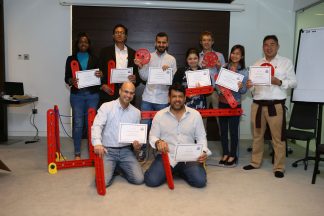Planning: the key to effective facilitation or a recipe for disaster?
The lesson of the 5 P’s, ‘Poor Planning Provides Poor Performance’ often resounds around training rooms. It’s not surprising that the importance of effective planning comes to the fore, but as facilitators of learning should we also construct and follow plans?
Elsewhere in my blog I’ve emphasised that facilitators must both understand individuals’ and groups’ objectives and that their role, as an enabler of learning, is to respond to and satisfy the emerging needs of a group.
The critical word here is ‘emerging’. A facilitator can’t possibly predict or find out exactly what will be appropriate for each individual to learn before meeting them. Of course you can predict that a workshop on team skills will cover aspects of communication, but you won’t know which aspects will be most relevant or why some people may or may not communicate effectively. Facilitating experiential learning is, by definition, a voyage into the unknown.
So where does this leave planning?
The answer is, that as the facilitator you have to be mentally and practically prepared for all situations, likely and unlikely. Before you intervene you must understand and be clear on why you need to. You need to know and be comfortable with the ‘big picture’; the line manager’s objectives and any organisational constraints first. This preparation is critical, it creates a reference framework that you can refer back to whilst you facilitate. Keep asking yourself the question “Is this helping us achieve our aim?”
Preparing the content of a workshop is a totally different matter. Your role will be to enable individuals’ and group learning which means that you’ll have to be constantly identifying and finding ways to satisfy learning needs. As soon as participants begin the first activity you should be gathering data with an open mind and using it to help you decide what you will do and how you will react. By definition therefore you cannot plan the details of a workshop, but you can prepare, and be prepared for, a range of likely situations and also be mentally prepared to work with the totally unexpected.
Don’t plan, prepare
Detailed planning for experiential learning is entirely inappropriate, but thorough preparation is essential!
- Post script:
Two personal examples may be of interest:
1. As I was chatting with a group over a cup of coffee at the start of a 3-day team development workshop, it became clear that the group was so dysfunctional that I had to replace my planned first activity with one I hadn’t even considered would be appropriate, and as a consequence everything changed!
2. I’d decided to use a 10 minute activity to introduce a 2-day workshop with a very senior team. The activity touched so many raw nerves that the learning review took the whole morning!
And the outcomes, both interventions received excellent feedback and what’s more, both were much more interesting and fun to facilitate than I’d expected!

